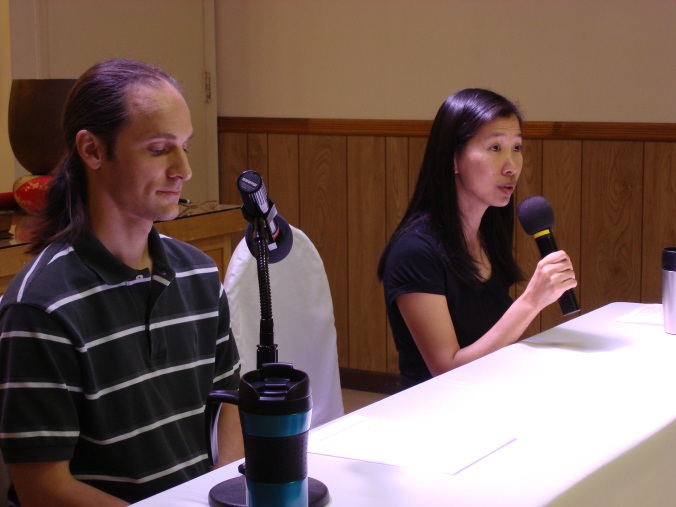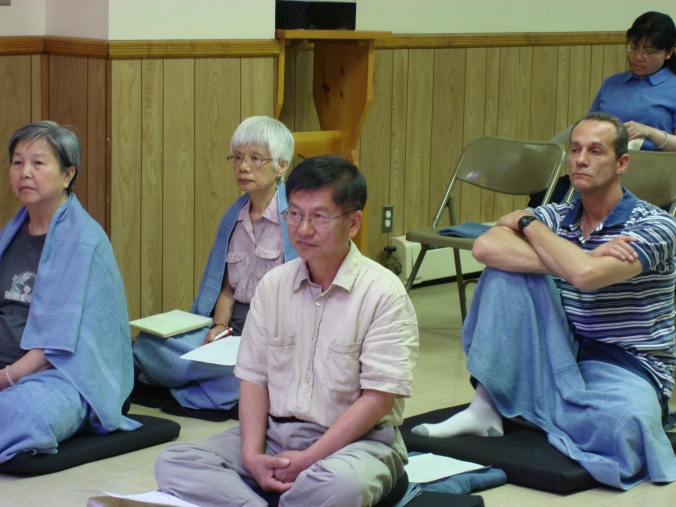
Fearlessness
By Chang Jie
07/19/2009
 On July 19, 2009, Dr. David Slaymaker, who teaches meditation and dharma at CMC and DDRC, gave a talk a CMC titled, “Fearlessness”. This talk was translated by Dr. Rebecca Li. The purpose of the talk was to try to understand and work with fear in a productive way. He shared his own stories about his own fear and how Buddhist practice has helped him. On July 19, 2009, Dr. David Slaymaker, who teaches meditation and dharma at CMC and DDRC, gave a talk a CMC titled, “Fearlessness”. This talk was translated by Dr. Rebecca Li. The purpose of the talk was to try to understand and work with fear in a productive way. He shared his own stories about his own fear and how Buddhist practice has helped him.
According to Dr. Slaymaker, one of paramitas or bodhisattva practices is giving, and one of the things that are given is fearlessness. Fears and insecurities are very widespread, not only causing a lot of trouble in people’s lives, but are common obstructions to the practice.
Dr. Slaymaker described some of the Buddhist perspective on fear. The Heart Sutra states: “Having no obstruction, there is no fear, and departing far from confusion and imagining, they reach ultimate nirvana.” This refers to Buddhas and bodhisattvas in advanced stages where they have no attachments whatsoever.
In the Nikaya Sutras, the Buddha said that there are wholesome and unwholesome fears. Wholesome fear motivates us to progress on the path and unwholesome fears obstruct us from living useful lives and progressing in the practice.
Fear comes from a basic function of our human nature. Our unenlightened mind functions on the basis of a self. We have a false notion a permanent self and have accumulated ideas about what the self is.
Dr. Slaymaker quoted from Shifu’s book, Hoofprint of the Ox—“Rather than the source of all comfort, self is the source of petty craving, fear, frustration,
 and sorrow. What we generally regard as self, is no more than a generation of momentary thoughts or impressions, a thought construct.” Obstructive fears come from the past and are not the “true nature of self”. They are not what’s happening right now in the present. Because we are not in the present, we have fear and obstructions. and sorrow. What we generally regard as self, is no more than a generation of momentary thoughts or impressions, a thought construct.” Obstructive fears come from the past and are not the “true nature of self”. They are not what’s happening right now in the present. Because we are not in the present, we have fear and obstructions.
Shifu says, “We should not be afraid or get upset when vexations arise…As long as you are not afflicted by them, in time, they will fade away.” Also, “Keep the mind, the attention, on the task at hand.”
Wholesome fear is sometimes described in conjunction with “shame” or “the fear of wrongdoing.” The Buddha says that one who is unafraid of wrongdoing is incapable of enlightenment. This type of fear is only wholesome if it motivates us and moves us to take action to improve ourselves and the conditions around us.
Shifu says, “Ordinary sentient beings fear consequences. Bodhisattvas fear causes.” We should understand causes and consequences and karma and turn causes of suffering into causes of cessation of suffering, which is the practice of the Four Noble Truths. This means understanding the cause of suffering, ceasing unwholesome actions, cultivating wholesome actions.
Dr. Slaymaker ended the talk with a question and answer session.
|